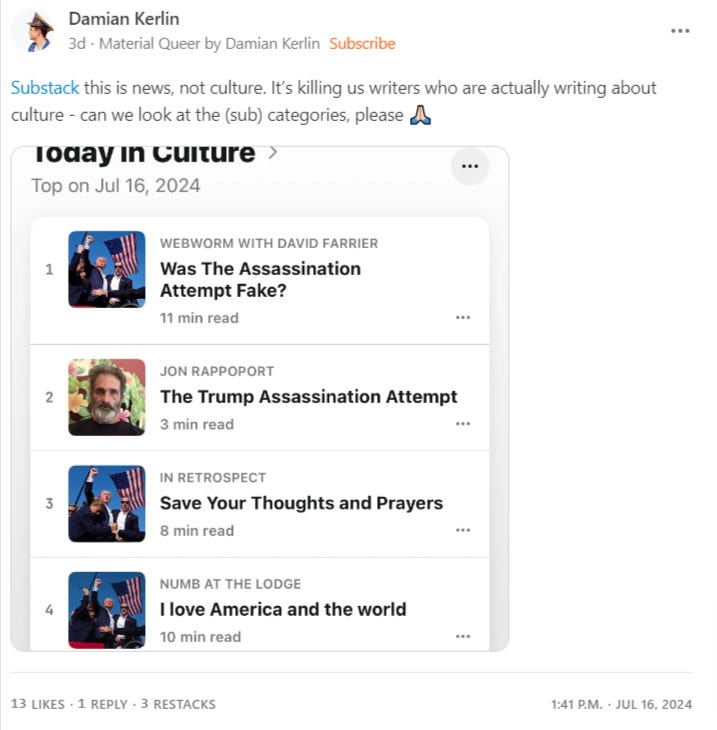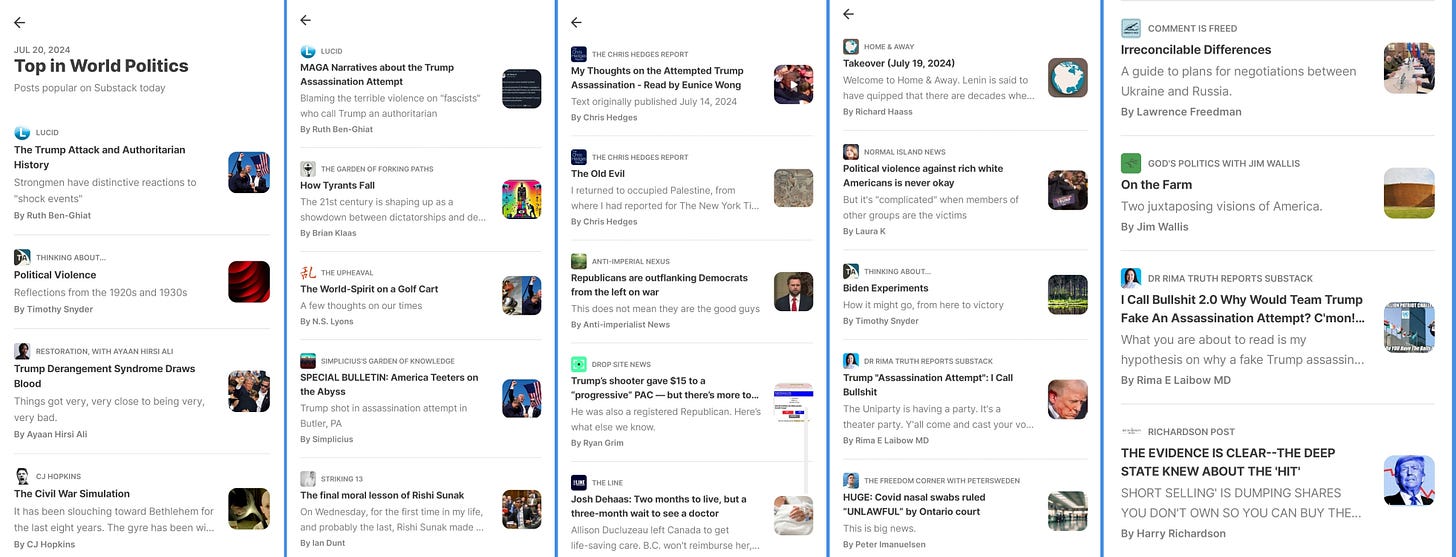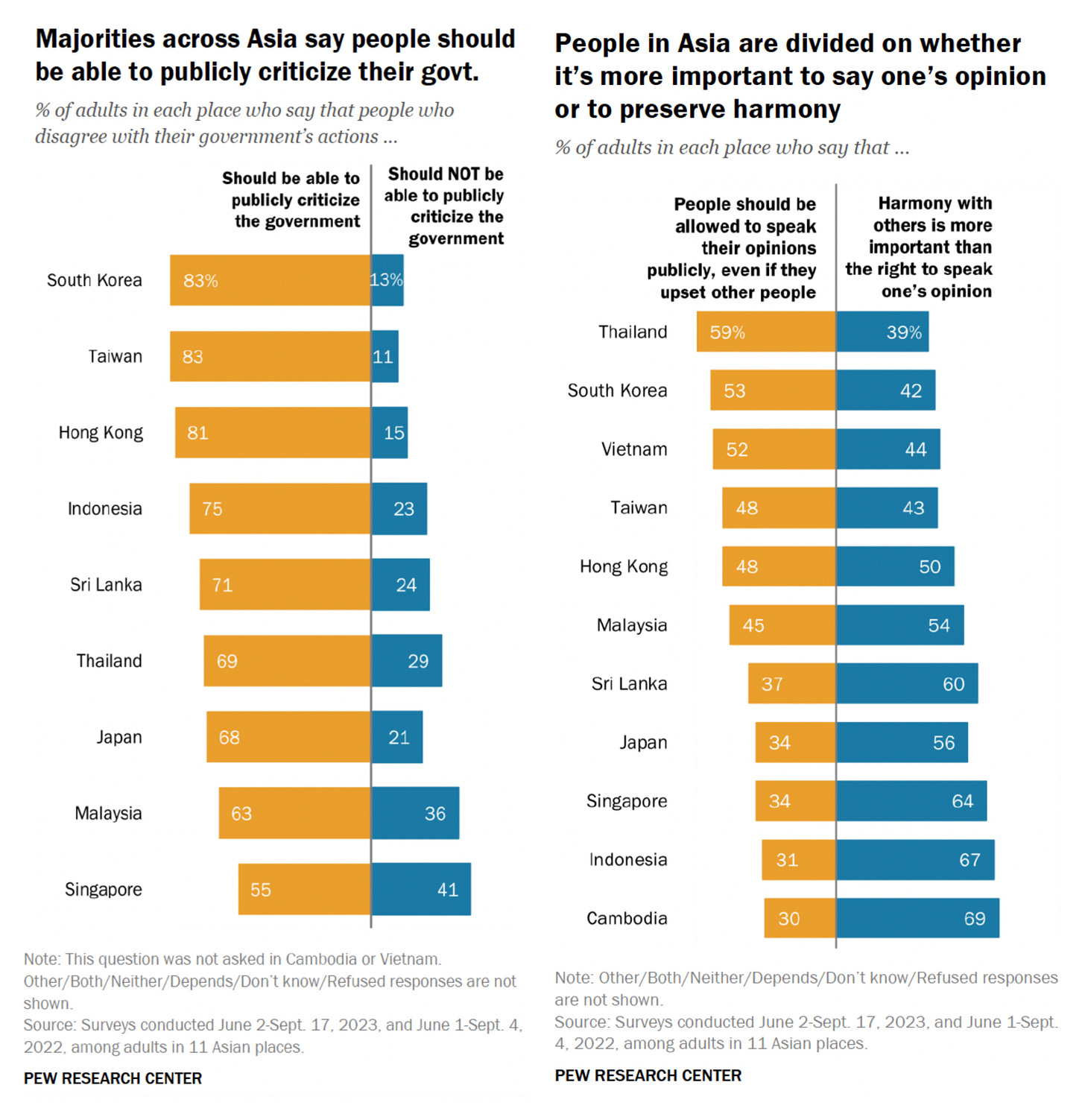The 220th Block: Some of us try to escape the dominance of US news
"Good luck, babe!" - Chappell Roan
This week…
Your reading time is about 9 minutes. Let’s start.
Queer culture writer Damian Kerlin noted that the culture section on Substack is not at all about culture, with the accompanying screenshot. Another Substacker Valerie Estrina wrote, “The culture section of Substack is so chaotic you’ll have five trending posts on the death of democracy and political assassination and a ‘my tits are out cause it’s brat summer’ essay squeezed right in between.”
Similarly, my world politics section for July 20th featured 23 posts—14 of which were on US politics (11 specifically on the assassination attempt). On a related note, Kevin McSpadden, who writes A6 - Where the world happens, wrote that it’s “tough out there for any American trying to get news outside of the election. Gotta turn to my trusted British and Asian press it seems.” More of such in the coming week, I bet, with Joe Biden dropping out of the 2024 presidential election.
I haven’t done this in a while but I’d love to recommend a few newsletters where you can find the news beyond the US:
Of course, McSpadden’s A6 is one of them. The name references the print tradition of putting news about international investments and geopolitical conflicts on page A6.
Jacob Redman's Everything Briefing is self-explanatory—a daily briefing of news from across the globe (delivered like a wire service).
Barry Malone’s Proximities highlights three non-Western news stories that you should know to counteract the dominance of Western news.
As before, I am always looking for news curators and writers with similar approaches, especially if they are from a non-US background or reporting from non-Western areas. In #219, I shared a story from Poynter by Elizabeth Djinis that found that even US readers are hungry for more global news but want it from journalists who come from the places they cover.
Global Press conducted online surveys with more than 1,200 American participants from a variety of demographic backgrounds. There was one requirement: Survey-takers had to have read international news “at least a few times a month,” according to the report. Of these readers, Global Press found that 77 per cent wanted stories written by local reporters “representative of the communities they cover” and 71 per cent preferred writing with “dignified and precise language” about its subjects.
When they saw traditional international journalism, often conducted by a white male reporter not from the country in which he was reporting, survey participants were able to say, “No, that’s not quite what I want.” But when they watched the pieces shift, watched the person who told the story change or the angle go from a disaster to a solution, participants “really came alive,” [Cristi Hegranes, Global Press CEO and publisher] said.
I understand and agree with the sentiment, although I also believe there is some value in having white male reporters report about global affairs for the white male audience. Sometimes, it’s the only way to make some inroads with a segment of this audience. John Oliver, for example, does a decent job at this, even if he doesn’t consider himself a journalist.
The one thing I would like to highlight about Global Press, whose style guide is pinned to the navigation bar on its site, is that they do not use “America” to refer to the United States. “Referring to the United States as America,” they explained, “demonstrates bias and alienates readers and sources across North, South and Central America. Precise geographical references promote reader clarity.” They have a similar guide for the “Arab world.”
And now, a selection of top stories on my radar, a few personal recommendations, and the chart of the week.
ICYMI: The Previous Block was about rogues, including scientific rogues. FWIW:
Academic journals are a lucrative scam—and we’re determined to change that by Arash Abizadeh for The Guardian.
Hundreds of racist plant names will change after historic vote by botanists by Ewen Callaway for Nature.
What is it like to attend a predatory conference? by Christine Ro for Nature.
CORRECTION NOTICE: Fixed punctuation errors and removed draft artifact. No big. ESPIONAGE / EXPENDABLES
Police hunt mayor accused of being Chinese spy
Joel Guinto for BBC:
A small town mayor in the Philippines who has been accused of being a Chinese spy has gone into hiding, officials said.
Police could not carry out a warrant for the arrest of Alice Guo over the weekend as she was not at any of her known addresses.
Scam centres were uncovered in Ms Guo’s town of Bamban in March, concealed in online casinos that cater to mainland Chinese.
Her story has played out like a TV drama, as she had also been questioned on her Chinese parentage and suspicions that she was working as an “asset” or spy for Beijing.
Ms Guo’s case has gripped the nation as Manila and Beijing continue to spar over reefs and outcrops in the South China Sea.
Is it popcorn time yet? Loosely linked:
Ex-CIA analyst charged with spying for South Korea by Madeline Halpert for BBC.
Russia convicts Evan Gershkovich of spying in a trial widely seen as politically motivated by Kirill Zarubin for AP.
WSJ in press freedom row over dismissal of HK union leader Selina Cheng by Erin Hale for Al Jazeera.
Kenya’s biggest protest in recent history played out on a walkie-talkie app by Stephanie Wangari for Rest of World.
Bangladesh imposes communications blackout as protest violence continues
Hannah Ellis-Petersen for The Guardian.
ALWAYS RIGHT
From Spain to Serbia, Europe’s populists use Trump shooting to slam the left
Seb Starcevic for Politico:
Slovak Prime Minister Robert Fico—who survived an attempt on his own life in May—hit out at Trump’s “political opponents” for fomenting hatred against him.
The former American leader’s critics “are trying to shut him down and when they don’t succeed, they piss off the public so much that some loser picks up a gun,” Fico wrote in a post on social media.
The Netherlands’ Geert Wilders, who leads the Dutch ruling-coalition far-right Freedom Party, said “the hate rhetoric from many leftish politicians and media, who label right-wing politicians as racists and Nazis,” amounts to “playing with fire.”
The leader of Spain’s far-right Vox party, the third-largest force in the country’s parliament, said the attempt on Trump’s life had been orchestrated by “the globalist left that is spreading hatred, ruin and war.”
Santiago Abascal accused Spain’s left-wing coalition government of being allied with that same globalist cabal, adding that Spain’s leaders were likely “regretting that the murderer has failed.”
Likewise, in Italy, Deputy Prime Minister Matteo Salvini blamed the shooting on “certain violent tones of the left.”
Thanks, Obama! Loosely linked:
How the far-right used TikTok to spread lies and conspiracies in Central Eastern European countries by Anastasiia Morozova, Iulia Stānoiu, Eva Stefankova, Josef Slerka, Kaili Malts, Petra Blum, and Zalán Zubor for VSquare.
Italian journalist told to pay PM Meloni 5,000 euros for tweet mocking her height by Keith Weir and Gavin Jones for Reuters.
Germany bans right-wing Compact magazine and searches properties by Miranda Murray and Swantje Stein for Reuters.
ENGINEERED
Will K-pop’s AI experiment pay off?
Megan Lawton for BBC:
There’s an issue dividing K-pop fans right now - artificial intelligence.
Several of the genre’s biggest stars have now experimented with the technology to create music videos and produce songs, including boy band Seventeen.
Last year the South Korean group sold around 16 million albums, making them one of the most successful K-pop acts in history. But it’s their most recent album and single, Maestro, that’s got people talking.
The music video features an AI-generated scene, and at the launch of the album in Seoul, one of the band members, Woozi, told reporters he was “experimenting” with AI when making music.
That’ll address the mandatory conscription issue, at least. Loosely linked:
China uses censors to test if AI models ‘embody core socialist values’ by Pascale Davies for Euronews.
Censorship slows China’s AI advances by Scott Rosenberg for Axios.
Meta is training its AI with public Instagram posts. Artists in Latin America can’t opt out by Lucila Pinto for Rest of World.
Everyone is judging AI by these tests but experts say they’re close to meaningless by Jon Keegan for The Markup.
Other curious links, including en español et français

LONG READ | The war over safe drug supply in Vancouver by Omar Mouallem for Maclean’s.
INFOGRAPHIC | From banking to flights and supermarkets: Charts show when IT outages peaked across services by Sky News. A Redditor said, “This is what Y2K wishes it was,” and I have no further comments to add.
You’re more likely to believe fake news shared by someone you barely know than by your best friend by Joshua Benton for Nieman Lab. Remember this the next time someone calls you the weak link.
How AI will change education by Rex Woodbury for Digital Native.
Sánchez propone que los medios hagan pública su propiedad y financiación y cambiar la ley de publicidad institucional por María Menéndez en RTVE.
La palabra para unirlos a todos por Guillem Martínez en CTXT.
Una mujer en la Presidencia (II) por Karolina Gilas en Proceso.
Quel rôle a joué BFMTV dans l’opération « Sauver Sarko » ? par Ingrid Gallois dans Le Nouvel Obs.
Rachat de Marianne : Kretinsky renonce au milliardaire d’extrême droite Stérin, Jean-Martial Lefranc nouveau racheteur par Sascha Garcia et Elise Viniacourt dans Libération.
Un clown qui fait du bien par Josée Bourassa dans Radio-Canada.
What I read, listen, and watch
I’m reading Semicolon (2019) by Cecelia Watson. Before picking up this book, I did not think a punctuation mark could be so controversial that it warrants an entire book. Silly me! I have quite literally shared (maybe more than once) the story of how another punctuation mark [the square brackets] almost derailed climate negotiations. In one of the meetings I covered, we weren’t even sure if we would have a resolution before we were due to get on our pre-booked return flight home because the climate nerds were fighting. Well, it is my duty to duly inform you that the semicolon was and still is, in fact, a controversial punctuation mark. It did not just affect people’s livelihoods but cost their actual lives! I can’t believe Kurt Vonnegut called it a “transvestite hermaphrodite”?? I now completely understand why people would fight over a silly text symbol!!
I’m listening to Tech Won’t Save Us. Paris Marx is joined by Sasha Luccioni, an AI researcher and climate lead at Hugging Face, to discuss the catastrophic environmental costs of generative AI being shoved into every tech product.
I’m watching a BBC documentary on the rise of Brazilian wellness influencer and life coach, Kat Torres, and the international search for her trafficked followers.
Chart of the week
Many adults in East and Southeast Asia support free speech and are open to societal change, according to a report by Manolo Corichi based on a 2023 Pew survey.






There's no escape!